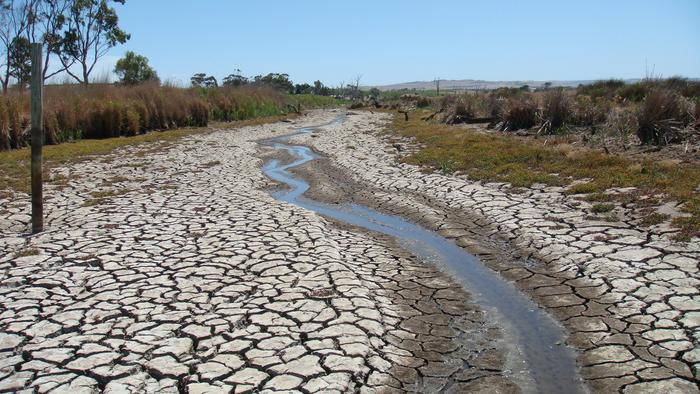A review of almost 1000 studies on the effects of climate change and extreme weather events on rivers around the world has found an overall negative effect on water quality in rivers globally.
An international team of experts, including scientists from the University of Adelaide and led by Utrecht University in the Netherlands, reviewed 965 studies, sourced from every continent, conducted between 2000-2022.
Multidecadal climate change was shown to have increased water temperatures and algae levels in 56 per cent of studies, which is partly responsible for a general decrease in dissolved oxygen concentrations in river water.
The review also found droughts and heatwaves led to increased salinity and higher concentrations of pollutants, such as pharmaceuticals.
“The severe effects climate change is already having on water quality globally are very concerning. Previous climate change predictions flagged this, but unfortunately, we are now seeing these extreme events play out across the world,” said Associate Professor Luke Mosley, who participated in the research.
“Rivers are intrinsically important ecosystems but also provide key water sources for drinking water and agriculture. Poor quality water can result in the river water being unsuitable for these uses.”
Some of the Australian data reviewed included studies led by Professor Mosley during the Millennium Drought, between 2007-2020.
During this time, the River Murray and Lower Lakes were at unprecedented low levels and suffered poor water quality, including extreme salinisation and acidification. Extreme ecological impacts such as the Lower Darling River fish kills in 2019 are a further example of the consequences of poor water quality.
Dr Michelle van Vliet of Utrecht University, who led the research, wants to see more data on water quality collected in non-Western countries.
“Most water quality studies now focus on rivers and streams in North America and Europe. We need a better monitoring of water quality in Africa and Asia,” said Dr van Vliet.
Although the research, published in Nature Reviews Earth and Environment, paints a dire picture of the deleterious influence of climate change around the world, Professor Mosley is hopeful that the decades-spanning view of these impacts, provided by the team’s work, will lead to the development of new systems of water management.
“Our findings stress the need to improve understanding of the complex hydroclimatic–geographic–human driver feedbacks and to develop technologies and water quality frameworks that support the design of robust water quality management strategies under increasing hydroclimatic extremes,” Professor Mosley said.
“It is hoped this research will spur increasing additional effort and collaboration globally to understand extreme water quality effects.
“Governments and other policy makers should take note of the findings and consider contingency plans and strategies to try to minimise water quality risks.”

Credit: Associate Professor Luke Mosley, University of Adelaide.
A review of almost 1000 studies on the effects of climate change and extreme weather events on rivers around the world has found an overall negative effect on water quality in rivers globally.
An international team of experts, including scientists from the University of Adelaide and led by Utrecht University in the Netherlands, reviewed 965 studies, sourced from every continent, conducted between 2000-2022.
Multidecadal climate change was shown to have increased water temperatures and algae levels in 56 per cent of studies, which is partly responsible for a general decrease in dissolved oxygen concentrations in river water.
The review also found droughts and heatwaves led to increased salinity and higher concentrations of pollutants, such as pharmaceuticals.
“The severe effects climate change is already having on water quality globally are very concerning. Previous climate change predictions flagged this, but unfortunately, we are now seeing these extreme events play out across the world,” said Associate Professor Luke Mosley, who participated in the research.
“Rivers are intrinsically important ecosystems but also provide key water sources for drinking water and agriculture. Poor quality water can result in the river water being unsuitable for these uses.”
Some of the Australian data reviewed included studies led by Professor Mosley during the Millennium Drought, between 2007-2020.
During this time, the River Murray and Lower Lakes were at unprecedented low levels and suffered poor water quality, including extreme salinisation and acidification. Extreme ecological impacts such as the Lower Darling River fish kills in 2019 are a further example of the consequences of poor water quality.
Dr Michelle van Vliet of Utrecht University, who led the research, wants to see more data on water quality collected in non-Western countries.
“Most water quality studies now focus on rivers and streams in North America and Europe. We need a better monitoring of water quality in Africa and Asia,” said Dr van Vliet.
Although the research, published in Nature Reviews Earth and Environment, paints a dire picture of the deleterious influence of climate change around the world, Professor Mosley is hopeful that the decades-spanning view of these impacts, provided by the team’s work, will lead to the development of new systems of water management.
“Our findings stress the need to improve understanding of the complex hydroclimatic–geographic–human driver feedbacks and to develop technologies and water quality frameworks that support the design of robust water quality management strategies under increasing hydroclimatic extremes,” Professor Mosley said.
“It is hoped this research will spur increasing additional effort and collaboration globally to understand extreme water quality effects.
“Governments and other policy makers should take note of the findings and consider contingency plans and strategies to try to minimise water quality risks.”
Journal
Nature Reviews Earth & Environment
Article Publication Date
12-Sep-2023




